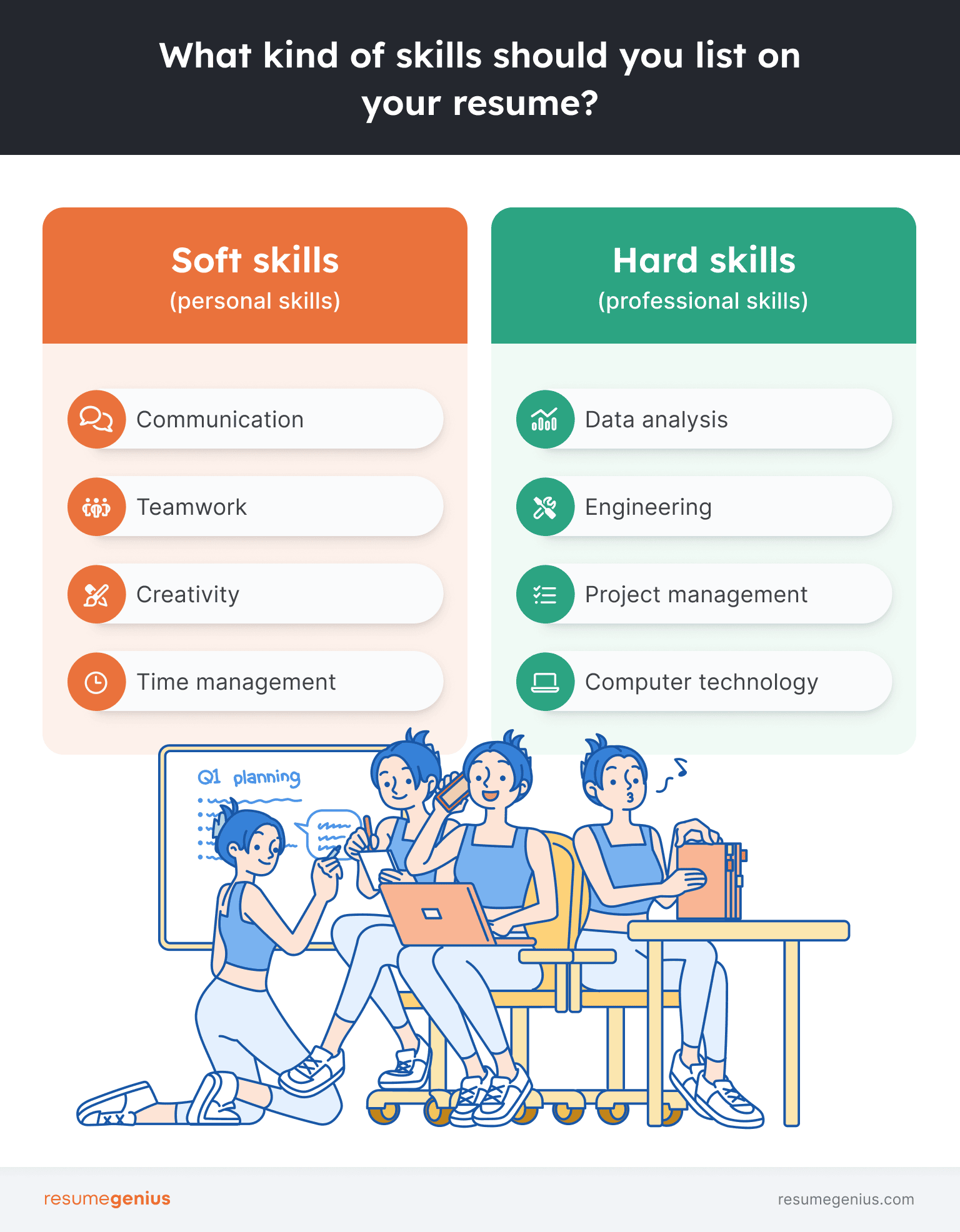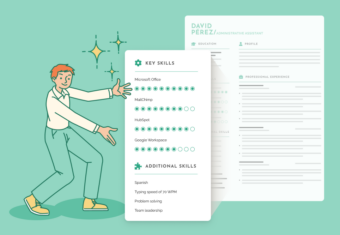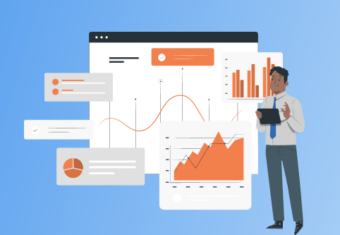We’ll explain the best skills to list on your resume, plus how to structure the skills section of your resume to help your application stand out.
What’s the difference between hard skills vs soft skills?
There are two types of job skills that hiring managers are looking for on your application – hard skills and soft skills. It’s important to include both skill types if you want to come off as a well-rounded candidate.
You get hard skills (like coding or medical knowledge) through education, training, or experience. They’re the abilities required to perform your job.
On the other hand, soft skills (like communication skills or interpersonal skills) help you interact with customers and colleagues more effectively, and make you a stronger addition to any team.
12 examples of good hard skills for your resume
Employers like to see hard skills on your resume because it tells them you already have a solid foundation of industry knowledge, and won’t require as much training and onboarding.
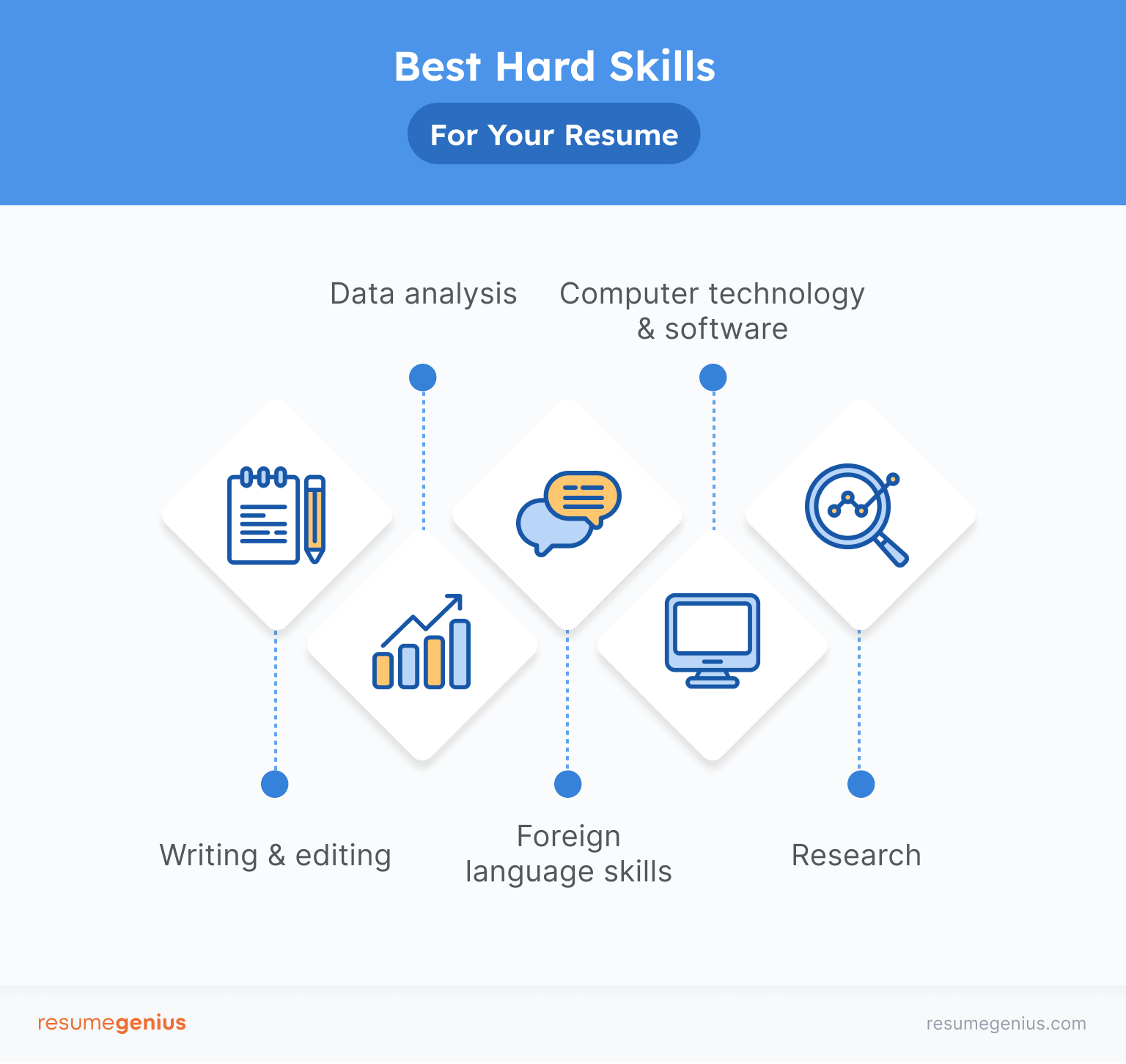
Here are 12 of the most popular industry-specific hard skills to list on your resume:
1. Design
Companies in nearly every industry need creatives with a strong sense of design to help them develop attractive products and content.
Specific examples of design-related hard skills include:
- UI/UX design
- Photography
- Web design
- Graphic design skills
- Industrial design
- Interior design
2. Marketing
An employee with strong marketing skills can take a struggling product and make it successful. That’s what makes marketing one of the most sought-after skills in nearly any industry.
Here are some specific examples of marketing hard skills for your resume:
- Advertising
- Campaign management
- Consumer research
- SEO/SEM
- Social media outreach
- Email outreach
3. Data analysis
Data is more valuable than ever – more valuable than oil according to some experts – and with all that data comes the need for people experienced in data analysis.
If you have strong data analysis skills, you should list your expertise on your resume to grab the attention of employers. Additional examples of data analysis-related skills include:
- Microsoft Excel
- Data visualization
- Data cleaning
- SQL & NoSQL
- MATLAB
- Python
4. Computer technology & software
Today nearly every job requires some level of computer literacy. Companies value candidates who have a range of technical skills relevant to their profession.
Here are some specific examples of basic computer skills to list on your resume:
- Adobe Creative Suite
- Microsoft 365
- Google Workspace (Google Docs, Drive, & Google Sheets)
- Knowledge of operating systems (MacOS, Windows, Linux)
- Communication platforms (Skype, Slack, Microsoft Teams)
- Team management software (Jira, Trello, Monday)
A recent survey of hiring managers revealed that employers hiring for technical roles want to see a high percentage of technical skills on your resume.
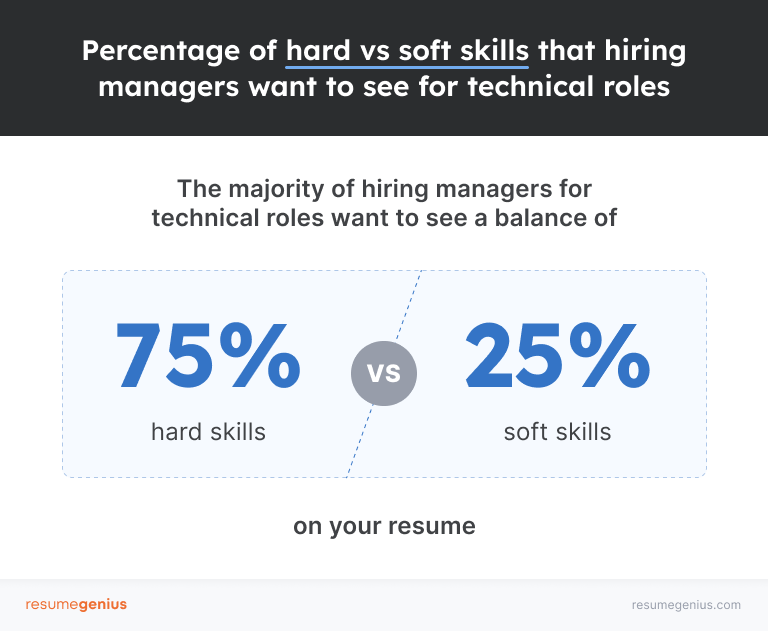
That means if you’re applying for a technical role, it’s extra important to highlight your hard skills on your resume.
5. Project management
Knowing how to guide a project from conception to completion is essential for nearly any position. Even if you’re not seeking a job as a project manager, strong project management skills are still valuable for many different careers and should be highlighted on your resume.
Some examples of project management-related skills are:
- Methodologies like Scrum, Agile, and Waterfall
- Kanban boards
- Risk assessment
- Budget management
- Scheduling
- Jira
6. Mathematics
Whether you work in software development or retail, having at least a basic understanding of math is a valuable hard skill for most industries.
If math is highly relevant to the job you’re applying to, go into detail about the types of mathematics you have experience with.
Here are some specific math-related skills to put on your resume:
- Calculus
- Mental arithmetic
- Geometry
- Python
- Trigonometry
- Statistics
- Logic
7. Research
Knowing how to conduct research efficiently is an important hard skill for many different jobs.
If you work in journalism, market research, or business analysis, you’ll want to prominently display your research skills on your resume.
Some specific research-related skills include:
- Data collection
- Scientific experimentation
- Survey tools (Pollfish, Qualtrics, Toluna)
- Data analysis
- Data interpretation
- Interviewing
8. Writing & editing
Being able to write clear, effective emails, papers, presentations, and messages is a valuable skill for many different jobs, especially those in business and marketing.
Here are some writing-related skills to include on your resume:
- Grammatical knowledge
- Style guides (APA, MLA, Chicago Manual of Style)
- Email drafting
- Copywriting
- Proofreading
- Blog writing
- Storytelling
9. Scientific expertise
If you work as a lab researcher or in another field in the hard sciences, your resume needs to highlight your relevant scientific skills. Here’s some general scientific expertise that you might list on your resume:
- Measuring
- Inference
- Experimental design
- Prediction
- Qualitative observation
- Classification
- Data analysis
- Scientific software (e.g., sequence analysis tools, image processing software)
10. Social media
Social media has become an essential method for companies, both big and small, to promote and market themselves.
Having good social media skills is especially important if you’re writing a social media marketing or brand ambassador resume. Specific social media-related skills include:
- TikTok
- YouTube
- Social media management software (Hootsuite, Sendible)
- Video editing software (Adobe Premiere Pro, Movavi Video Editor)
11. Foreign language skills
Whether you work in retail or in finance, knowing how to speak multiple languages makes you an asset to any company.
Here are some specific resume language skills to highlight when applying to jobs:
- Translation
- Verbal fluency
- Written fluency
- Conversational skill
- Language proficiency level (based on formal test scores for that language)
12. Accounting & finance
Companies always need employees who can handle their finances and perform accurate bookkeeping. Even if you don’t work as an accountant, being able to handle basic finance tasks is helpful for a variety of jobs in business and fundraising.
Some accounting and finance-related skills include:
- Microsoft Excel
- SQL
- Advanced modeling techniques
- Microsoft Visual Basic
- QuickBooks
- General business knowledge
12 of the best soft skills to list on your resume
While hard skills make up the basic requirements for performing a job, your soft skills are what help you truly excel in the workplace.
For customer-facing jobs, your soft skills are just as relevant as your hard skills to your ability to do the job.
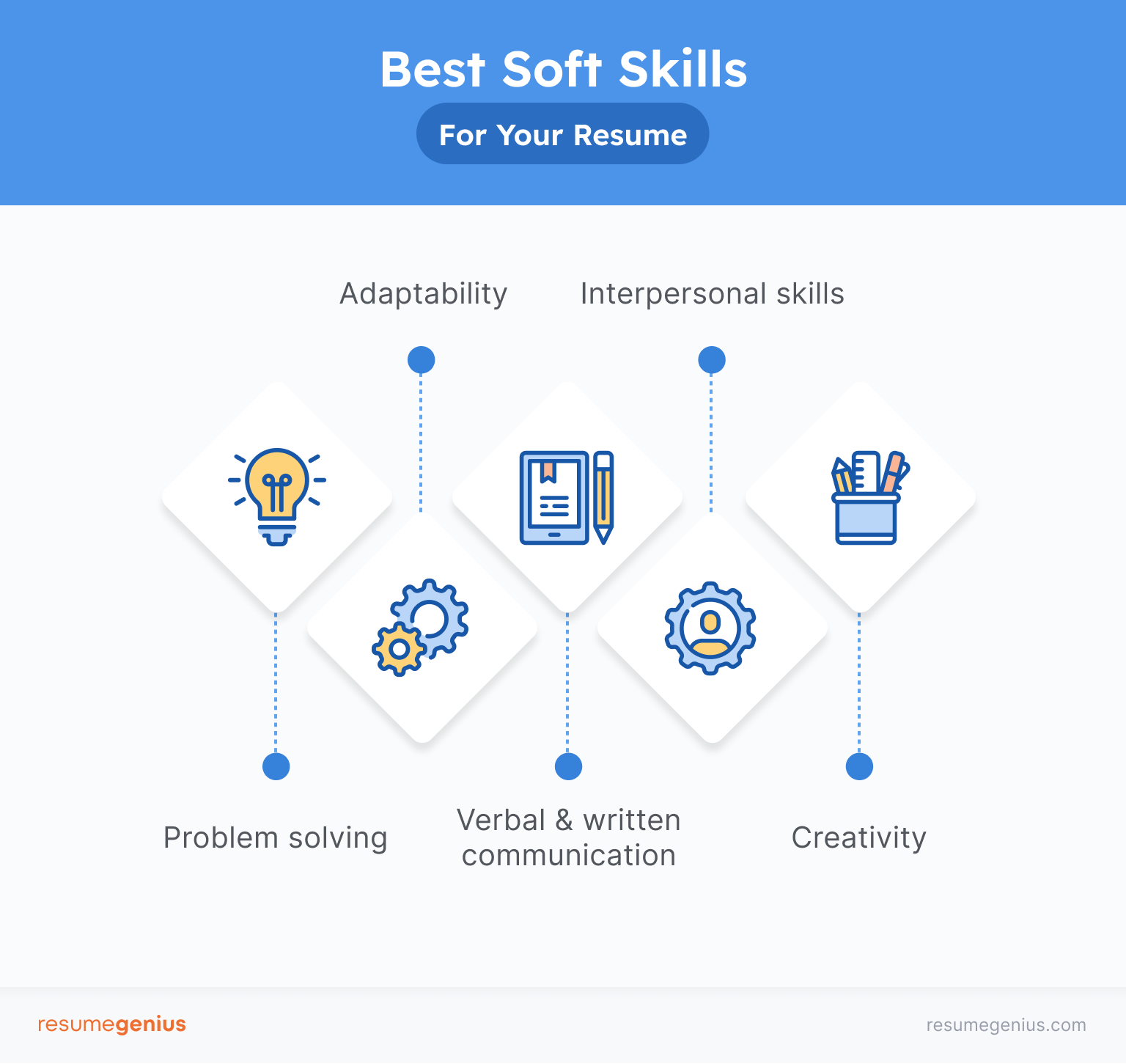
Here are some of the most important soft skills to include on your resume:
1. Verbal and written communication
Being able to convey your ideas clearly is an important skill for any job. Even if you don’t regularly work with people face-to-face, strong communication skills can help you present your ideas to colleagues and negotiate for raises or promotions.
If you have good communication skills, highlight them prominently on your resume – especially if you’re writing a resume for a customer service job.
2. Teamwork
Very few jobs don’t require you to work with other people. Show employers you can thrive in a team setting by showcasing examples of work you accomplished thanks to your excellent teamwork skills.
3. Adaptability
Since a massive shift toward remote and hybrid work, adaptability has become one of the most valuable soft skills you can possess.
It’s increasingly important to show employers that you can keep up with rapid changes and be flexible in the way you work. Impress potential employers by demonstrating how you’ve adapted to new situations or work requirements and managed to thrive amidst these changes.
4. Problem-solving
No matter your industry, problem solving skills are useful for tackling obstacles you face while working. If employers know you’re a good problem solver and capable of handling issues on your own (whether small or large), then that’s less for them to worry about.
5. Patience
Patience is a desired soft skill in a wide range of contexts. From interacting with customers and training new employees to performing long and complex tasks like video editing or negotiating business deals, being patient simply makes work easier.
6. Creativity
Creativity isn’t only a useful skill for people working in fields like design. The ability to think creatively will make you a more effective problem solver and allow you to offer innovative ideas at work, no matter what industry you’re in.
7. Strong work ethic
If there’s one thing all employers prize, it’s a strong work ethic. Candidates with a strong work ethic are more likely to excel in their role, achieve highly, and grow into managerial positions.
Our study shows that hiring managers value dependability and responsibility over all other soft skills. This makes work ethic one of the most important qualities to demonstrate on your resume:
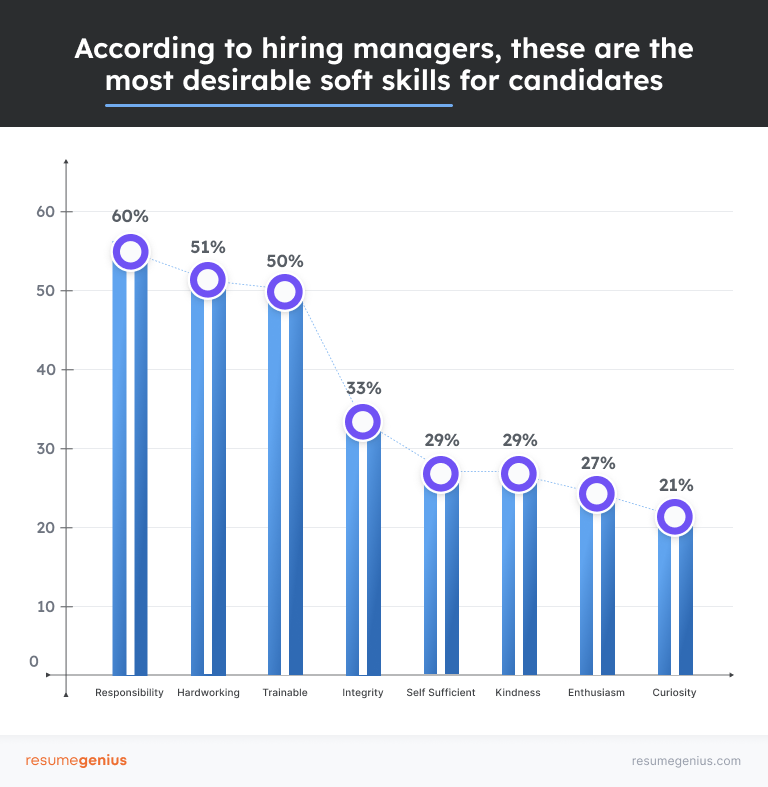
8. Interpersonal skills
Interpersonal skills help you build positive relationships with colleagues and the people you encounter at work. Your interpersonal skills determine your ability to cooperate within a group and contribute to a healthy and productive workplace.
9. Time management
Having good time management skills helps you complete your work effectively, meet deadlines, and stay organized. Employers love to see that you have time management skills because it means you’ll be able to contribute to the smooth operation of the business.
10. Multitasking
Being able to handle multiple tasks at once is a valuable soft skill to have for many different jobs. From office work to food service, employers are always interested in candidates who have strong multitasking skills.
11. Leadership
Whether you work in management or just want to be an essential member of your team at work, good leadership skills are essential for advancing your career.
Candidates who demonstrate their ability to lead others are highly valued by companies because they can help guide the whole team to success – plus they make ideal managers.
12. Attention to detail
Having an eye for detail is a skill you can apply to nearly any job. Employees with strong attention to detail produce reliable work and require less micromanagement, which makes your coworkers’ lives easier.
100+ job-specific skills to put on a resume
The best skills for your resume are always the ones that are directly relevant to the job you’re applying for. Here are some of the top hard and soft skills for various industries:
Administration and office support
Here are some key administrative assistant skills that you can list on your resume if you work in an office. You can also list project management skills if you take the lead on projects.
Admininistrative Skills to Include on Your Resume
| Hard Skills | Soft Skills |
|---|---|
| Photocopier skills | Time management |
| Data protection CALoppa/CCPA | Scheduling |
| Computer skills (Office) | Organizational skills |
| Language skills (Spanish, Arabic, Persian) | Problem solving |
| Project management software (Microsoft Project, Confluence) | Adaptable |
Customer service
If you work in a call center or handle customer issues, add these customer service skills to your resume. CSR skills show hiring managers you’re good at dealing with clients and know how to use software to track customer issues:
Customer Service Skills to Add to a Resume
| Hard Skills | Soft Skills |
|---|---|
| Technical skills (LiveChat and Blazedesk) | Problem solving |
| Product/service knowledge | Diplomacy |
| Software skills (Kayako and Zendesk) | Negotiation |
| Language skills (Spanish, French, Pennsylvania Dutch) | Patience |
| Research skills | Empathy |
Delivery
Add some of these skills to your delivery driver resume to demonstrate your skill at handling packages and keeping to a schedule:
Delivery Skills for Your Resume
| Hard Skills | Soft Skills |
|---|---|
| Driver’s license | Customer service skills |
| Satnav operation | Communication skills |
| Vehicle maintenance | Working under pressure |
| Recording mileage | Time management skills |
| Route planning | People skills |
Marketing
Skills such as the ones listed below are perfect for marketing resumes because they show you’re comfortable using industry-specific tools:
Marketing Skills to List on a Resume
| Hard Skills | Soft Skills |
|---|---|
| Social media platforms (Twitter, Pinterest, and Instagram) | Organizational skills |
| Google Analytics | Adaptability |
| Coding skills (HTML, CSS, and CRM tools) | Communication skills |
| Analytical tools (SEMRush, WordPress, and Ahrefs) | Prioritization |
| Research skills | Creativity |
Nursing
Here are some common nursing skills to note in your application to prove you can effectively care for patients:
Nursing Skills for a Resume
| Hard Skills | Soft Skills |
|---|---|
| Hygiene | Emotional resilience |
| Medicine administration | Critical thinking |
| Performing diagnostic tests | Bedside manner |
| Preventative care | Empathy |
| IV administration | Time management |
Sales/retail
Sales skills are vital for anyone in diverse retail jobs. Hiring managers want to know you can help them keep profits up.
You’ll also need great cashier skills if you’ll be ringing up items:
Sales Skills for a Resume
| Hard Skills | Soft Skills |
|---|---|
| Computer skills | Time management |
| Arranging displays | Listening skills |
| Labeling items | Diplomacy |
| Point of sales (POS) systems | Patience |
| Math skills | Interpersonal skills |
| Product management | Presentation skills |
Teaching
Include these skills in your teacher resume to show you can teach people new skills and information:
Teaching Skills to Add to a Resume
| Hard Skills | Soft Skills |
|---|---|
| SMART boards | Storytelling skills |
| Blackboard | Leadership skills |
| Microsoft Office | Communication skills |
| Lesson planning | Versatility |
| Curriculum writing | Presentation skills |
Waiter/barista
Add some of these skills to your server resume to show you’re great at looking after customers and keeping orders straight:
Server Skills to Include on Your Resume
| Hard Skills | Soft Skills |
|---|---|
| Point of sale (POS) system operation | Salespersonship |
| Math skills | Customer service skills |
| Hygiene/OSHA | Conflict resolution |
| Menu recall | Problem solving |
| Coffee machines | Friendly demeanor |
Business analyst
Here are some skills for your business analyst resume to show employers that they can count on you to collect and interpret data to inform important business decisions:
Business Analyst Skills For a Resume
| Hard Skills | Soft Skills |
|---|---|
| Jira and Confluence | Time management |
| Process modelling | Public speaking |
| SWOT analysis | Negotiation |
| Stakeholder analysis | Organization |
| Data mining and analysis | Interpersonal skills |
Web developer
Include these skills on your web developer resume so employers know you have the technical and soft skills needed to be a pro developer:
Web Developer Skills For a Resume
| Hard Skills | Soft Skills |
|---|---|
| Programming languages | Attention to detail |
| Testing and debugging | Problem solving |
| Web hosting | Analytical skills |
| Version control systems (Git) | Time management |
| Libraries and frameworks | Communication |
How to list skills on a resume
Now that you know some of the skills that employers are looking for, you need to know how to include them on your resume.
When adding skills to your resume, follow these 6 steps:
1. Identify what skills employers are looking for
The best way to identify what skills employers are looking for is by analyzing job openings in your industry.
Take this job ad for a nursing position, for instance. We’ve highlighted soft skills in green and hard skills in yellow:
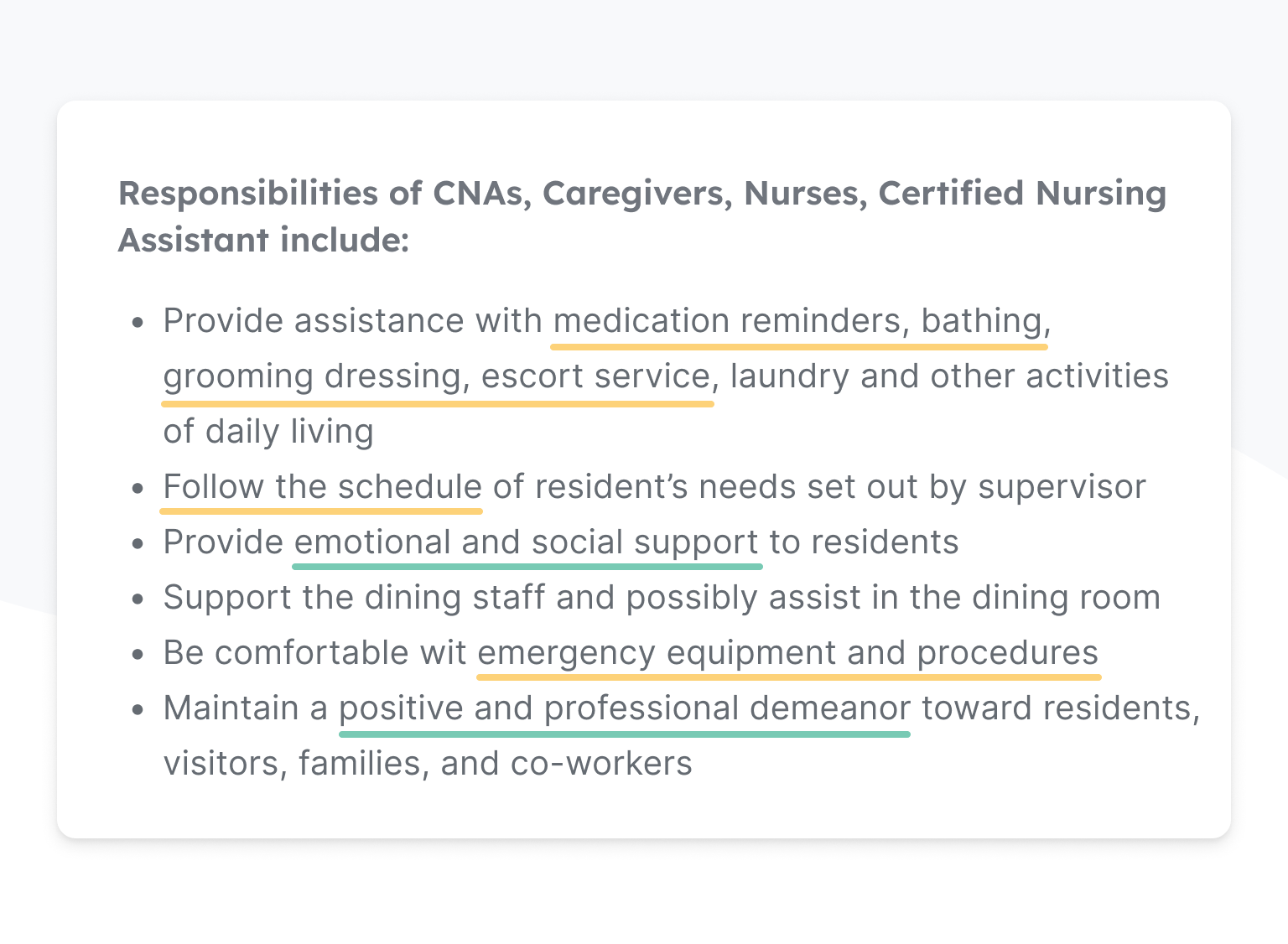
In this ad, you can quickly pick out several good skills to put on your resume. For example, there’s a range of technical skills needed for the position in the bullet points, as well as many soft skills that help define the ideal candidate.
It’s also a good idea to identify some skills that are highly relevant to your industry and add those skills on your LinkedIn profile so recruiters can see them.
2. List your skills in a dedicated skills section
Your resume skills section is the most important place to list your relevant skills. This section is one of the first places on your resume employers will look to see if you’re qualified to do the job, so make sure you’ve listed the appropriate job skills here.
If you have a mix of hard and soft skills and no advanced technical expertise, simply title your section “Skills” or “Additional Skills” and list your skills using bullets.
Here’s what a basic skills section looks like:
Properly formatted resume skills section
Skills
- InDesign
- Photoshop
- Adobe Illustrator
- Figma
3. Specify your level of proficiency (when appropriate)
Employers want to know how experienced you are with certain skills before they interview you. To communicate this information, you should clearly specify your skill levels.
For example, if you list Spanish as a skill on your resume you should include a metric that indicates your level of proficiency, such as “Intermediate”, “Fluent”, or “Basic.”
However, keep in mind that quantifying your skills only works for languages or technical skills. Soft skills are difficult to measure, so you shouldn’t quantify them on your resume.
4. Highlight your skills in other parts of your resume
If you really want to highlight certain skills on your resume, just listing them in a skills section isn’t enough. You also need to provide concrete examples of how you put your skills to work.
To really highlight your skills, include examples of how you used them to accomplish something throughout your work experience section.
Here’s an example of a work experience section that demonstrates customer service skills:
- Answer 60+ customer calls a day, responding to inquiries, complaints, return requests, and providing product information
- Received a 93% customer satisfaction rate, 10% higher than the company average
- Effectively use PeopleSoft CRM to resolve 95% of customer issues
- Transitioned to hybrid work model while maintaining productivity levels and integrating new communication software including RingCentral and Zoho Meeting
These bullets are effective because they demonstrate the skills the candidate mentioned in their resume summary (communication, adaptability, Oracle PeopleSoft, and analytical skills) using specific context.
If you’re a student or a recent graduate, you can also use your resume’s education section to highlight skills by expanding the section to include relevant coursework. This can be a great way to demonstrate your relevant skills like research, writing, teamwork, presenting, or data analysis.
Frequently asked questions about resume skills
Here are answers to some of the most common questions job seekers have about resume skills:
What are the best skills for resumes in 2024?
The best skills for resumes in 2024 are skills that make you look qualified for the specific job you’re applying for. However, it also helps to take into account recent changes to how companies operate.
Showcasing your knowledge of remote working software and emphasizing that you’re self-sufficient is a great way to prove to employers that you’re ready for the modern workplace.
What skills should I put on my resume if I have no work experience?
You most likely developed some hard skills in school, such as research or presenting. You can also put soft skills on your resume. For example:
- Critical thinking
- Communication
- Leadership
- Teamwork
- Positive attitude
- Assertiveness
- Time management
Additionally, listing language skills on your resume (if you have any) is a great way to set yourself apart from other more experienced applicants in the US.
How do you organize skills on a resume?
You organize skills on a resume by listing your most job-relevant abilities at the beginning of your skills section.
You can also feature your best skills in your resume introduction to catch employers’ attention right away.
What do you put in the skills section of a resume?
You put relevant hard and soft skills in the skills section of a resume. Hard skills are skills you’ve learned, like using point-of-sale systems. Soft skills are related to your personality, like communication skills and empathy.
Some of the most common skills to put in the skills section of a resume are:
- Computer skills
- Organization
- Collaboration
- Software (e.g., Adobe Photoshop, Salesforce, & QuickBooks)
- Programming skills (e.g., C++, Python, & HTML)
- Time management
- Presentation-giving
- Attention to detail
- Customer service
- Sales skills
Additional FAQs
More skills-related resources for different industries
Here are additional skills-related articles for 10 different types of jobs:
Click to rate this article
4.8 Average rating



